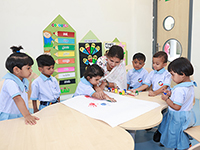To address this, CBSE schools are embracing technology to better prepare students for the future. Institutions like the Global Indian International School Nagpur are leading the way, using digital tools and platforms to make learning more engaging, accessible, and effective. This guide will explore how these schools are evolving to provide a modern education that equips students with the knowledge and skills for tomorrow.
Trends in EdTech: How Digital Tools Are Transforming CBSE Education
1. Personalized Learning
2. Interactive and Gamified Learning
3. Virtual Classrooms and Online Resources
4. Artificial Intelligence (AI) and Machine Learning
5. Focus on Digital Literacy
Benefits of Digital Learning
- Flexibility: Digital learning provides students in CBSE schools with the ability to learn at their own pace. It allows them to revisit topics from the CBSE syllabus or move ahead when they feel ready. This flexibility makes it easier for students to tailor their learning schedules around other activities, adapting to their individual needs.
- Accessibility: With the rise of technology integration, students in international CBSE schools can access learning materials from anywhere, breaking down geographical barriers. Whether they are studying in rural areas or abroad, digital tools ensure that the CBSE syllabus is available to all, making quality education more inclusive and widely accessible.
- Engagement: Interactive elements in digital platforms, such as videos and quizzes, make lessons more engaging for students in CBSE schools. Through effective technology integration, digital learning keeps students actively involved, ensuring that complex topics from the CBSE syllabus are more easily understood and retained.
Popular E-learning Platforms and Apps for CBSE Students
1. TopperLearning
2. BYJU’S
3. Khan Academy
4. myCBSEguide
5. Vedantu
Vedantu offers digital learning experiences tailored for CBSE students from Classes 6-12, with courses designed and taught by experienced teachers from top engineering and medical colleges. It provides comprehensive courses and interactive live classes, ensuring a personalized and engaging learning experience.
At Global Indian International School Nagpur, we encourage the use of such platforms to supplement classroom learning and promote independent study.
Best Practices for Effective Online Learning: Tips for Students
- Create a Study Schedule: A consistent routine helps students manage their time better.
- Take Regular Breaks:Sitting in front of a screen for long periods can be tiring. Encourage students to take short breaks.
- Stay Organized: Use digital tools like Google Classroom or Microsoft Teams to keep track of assignments and deadlines.
- Stay Engaged: Actively participate in discussions, ask questions, and make use of all resources available.
Integrating Technology in CBSE Classrooms: Challenges and Opportunities
- Challenges: Not all students have access to devices or a stable internet connection, making digital learning difficult for some. Teachers also need training to effectively use these new tools.
- Opportunities:On the flip side, technology integration makes learning more dynamic and personalized. For instance, tools like smart boards and online assessments offer real-time feedback, helping students track their progress.
The Role of Teachers in Facilitating Digital Learning
1. Designing Digital Curriculum
2. Facilitating Digital Literacy
3. Personalizing Learning
4. Collaborating with Parents and Families
5. Assessing Student Progress
Digital tools provide various ways to assess student learning. Teachers use these tools to track progress, provide timely feedback, and adjust instruction based on student performance.
At GIIS Nagpur, our teachers are trained to seamlessly incorporate technology into their teaching strategies, making learning both engaging and effective.
Parent’s Guide to Supporting Digital Education at Home
- Set Up a Dedicated Study Space: Ensure your child has a quiet, comfortable space to focus on their lessons.
- Monitor Screen Time:While digital learning is crucial, it’s also important to limit unnecessary screen time.
- Stay Involved: Regularly check in on your child’s progress and communicate with teachers when necessary.
Conclusion
As digital learning continues to transform CBSE education, embracing these changes is essential for the growth and success of students. At Global Indian International School Nagpur, we are committed to providing a future-ready learning environment, ensuring our students are equipped with the skills and knowledge to thrive in a global, tech-driven world.
For more information on admission in CBSE school, visit our website or contact us today!

























